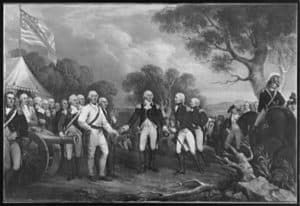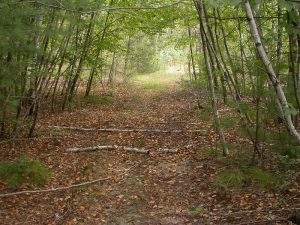Brister Freeman was the younger brother of Zilpah White, another former slave who made a home in Walden Woods. Brister was born in 1744 to Lincoln and Zilpah who were enslaved on different estates in Concord. In his famous book Walden, Thoreau makes the mistake of conflating Sippio Brister and Brister Freeman. In fact, they were two different freeman living around Concord at the same time.
Before gaining his freedom, Brister was most likely enslaved by Chambers Russell along with his sister Zilpah. He was later enslaved by Timothy Wesson before being given as a wedding present to John Cuming. Brister spent twenty-five years enslaved by John Cuming. Today the state prison in Concord stands where John Cuming’s estate was. While Cuming’s legal property, Brister served in the American Revolution. In 1777, Brister served alongside John for five weeks in Saratoga, NY. The next fall, they served together for an additional month. In 1779, Brister, on his own, enlisted for a three-year term. On this final enlistment, he used a new name, not Brister Cuming, but Brister Freeman.
After his service, Brister gained his freedom.

On his death, John Cuming left substantial money for Concord schools. He also left money for his former slaves including Brister. However, the money did not go to Brister directly, but was given to the town to provide for them if they were ever on the poor list.
Brister and another former slave, Charlestown Edes, pooled their resources to buy land in Walden Woods. Together they bought an acre of land in 1785. In order to provide for their families, Brister and Charlestown pulled wool from dead sheep at a slaughterhouse about a mile from Walden Woods. The owner of the slaughterhouse was Peter Wheeler, who had served under Col. John Buttrick with Brister as they marched toward Saratoga in 1777.
Brister’s wife Fenda also worked to support her family. Henry Thoreau writes, “With him dwelt Fenda, his hospitable wife, who told fortunes, yet pleasantly.”
In an action that Thoreau duplicated while at Walden, Brister Freeman did not pay his poll tax. Brister did not pay his poll tax for many years, and his debt accumulated to 7 pounds, 19 shillings. Town officials used this as an excuse to take away Brister’s property. Interestingly, they did not make Brister leave his house. Instead, on January 17, 1791, officials made him sign over his portion of the house and land he shared with Charlestown. It seems Concord officials did not want Brister to be able to participate in town meeting, which was only available to property owners. The town did not harass Charlestown Edes perhaps because he had not been enslaved in Concord. Charlestown was also sickly and died later that year on August 6, 1791 of scurvy.
In a note on a land survey Thoreau made of Walden Woods in 1857, he references this story. He noted that, “Brister Lot” had become “the state’s because the owner, Brister was a foreigner.”
As time passed, Brister’s family grew and his house became crowded. His two surviving children, Nancy and Amos, married and had children. Then in July 1810, Brister lost his 3-month-old grandson to tuberculosis. A year later, Brister’s wife Fenda died after living in Walden Woods for 26 years. Around this point, Brister’s daughter’s family moved away. His son Amos soon followed, leaving Brister with his daughter-in-law and her grandson born in 1814.
After his wife died, Brister became involved with another woman who lived in Walden Woods. He began a relationship with a white widow named Rachel Le Grosse. Because they were an interracial couple, Massachusetts law prevented them from being married. However, they found another way to ensure that Rachel could inherit Brister’s land after he died. Rachel bought Brister’s acre for twenty dollars. For whatever reason, no one disputed Brister’s right to sell the land he had been stripped of years before.
Unfortunately, Rachel owed money on her husband’s property. She was in debt with Peter Wheeler, the owner of the nearby slaughterhouse. Peter took out his frustration on Brister, the man he served alongside in the Revolution. In the winter of 1812-13, Brister walked by Peter’s slaughterhouse after he and his employees had shut an aggressive bull in the barn. Peter’s biographer writes, “Giving his men the wink,” Peter “inquired very affectionately after Brister’s health, and told him if he would go into the slaughter-house and get an axe, he should have a little job to do. When Brister went into the barn, Peter and his workers quickly locked the door behind him, leaving Brister to defend himself against an angry bull. Somehow, possibly with the axe Peter had mentioned, Brister killed the bull and escaped the barn alive. Brister left the scene without speaking to anyone.
Peter Wheeler died shortly after on May 12, 1813. His daughter started a school for infants, and in 1823, one of her students was David Henry Thoreau.
Brister died about ten years after the bull incident, on January 31, 1822. His daughter-in-law had died two years before, leaving Brister to tend to his 6-year-old grandson John. Thoreau wrote that Brister was buried in Lincoln, but that was really Sippio Brister. Brister Freeman’s gravesite is unknown.

Today Brister is remembered in the landscape of Walden Woods with Brister’s Hill. Unfortunately, this name does not represent landownership, as Brister did not own the land for very long. Still, he is the person most associated with the area. In 2006, The Walden Woods Project created a walking path on Brister’s Hill. Readers are invited to walk on Brister’s Hill and consider the legacy of the first man to evade his poll tax in Walden Woods.
To learn more about the early residents of Walden Woods, read
- Former Inhabitants
- Lemire, Elise. Black Walden: Slavery and Its Aftermath in Concord (Philadelphia: University of Pennsylvania Press, 2009).

